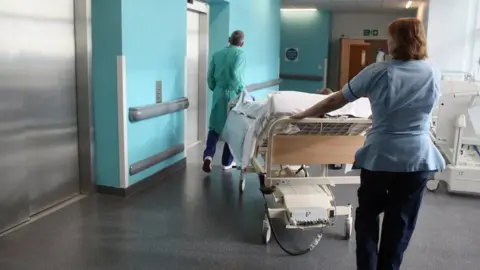NHS Scotland needs five years to recover - Health secretary
Scotland's NHS is not performing well and will take "at least five years" to fix, the health secretary has said.
Humza Yousaf warned this winter would be "the most challenging the NHS has faced". He said hospitals were dealing with the legacy of the pandemic, tighter budgets and reduced staffing.
It comes as more than 6,000 nursing and midwifery posts are unfilled.
Recent figures showed that less than 70% of people attending A&E were seen with four hours. The target is 95%.
In an interview with BBC Scotland's The Sunday Show, Mr Yousaf said he hoped people understood the reasons why the NHS was under "such significant pressure".
"It is not performing at the level that any of us would like, that is stating the obvious," he said.
"There's myriad factors - the effect of the pandemic being the most significant - but it's not the only factor.
"One of the biggest problems in our hospitals is the high level of delayed discharge, 1,800 people who are clinically safe cannot get out because local authorities are unable to provide social care, either at home or care home places."
Mr Yousaf said social care had been hit been hit by "a triple whammy" of Brexit, the pandemic and high energy and inflation costs.
He said this created a tough business model for care home operators.
 Getty Images
Getty ImagesMr Yousaf's comments came as more than 7,000 people were waiting over two years to start hospital treatment at the end of last month.
The health secretary said the recovery of Scotland's NHS "is happening", but it would take time.
He added: "It will take years. It isn't going to happen in the course of winter.
"Our recovery plan is over the course of five years , because this is going to take at least five years.
"This winter itself is going to be the most challenging the NHS has ever faced."
'Sustainable investment'
His warning comes as nursing staff are balloting for strike action, after criticising a pay offer of a flat rate of £2,205 per person, backdated to April.
The Royal College of Nursing (RCN) said it was a real-terms pay cut and accused the government of not listening to staff concerns.
However, Unison suspended its strike ballot of NHS staff and is consulting on a revised deal.
Jillian Evans, head of health intelligence at NHS Grampian, told BBC Scotland staffing levels were "crucial" to tackling problems in the NHS
She called for sustainable investment to grow the NHS workforce.
She told The Sunday Show: "If I was to say that we need more beds in hospital to cope with increases in demand, then you have to staff those beds.
"You can't just open the beds and expect staff to continue at the same level of care."
Ms Evans said reluctance to join the health profession could arise from ongoing "uncertainties" over pay.
"What we have often is an investment in our health services, which can sometimes be a little sporadic - sometimes it comes, sometimes it stops," she said.
"What really would be great would be to have a long-term plan for our workforce and sustainable investment to make that happen.
"With that confidence and certainty, it provides a much better, stable basis for staff to come and work in the NHS."
